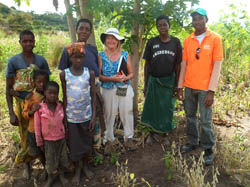Julieta Mario comes from a long line of good women farmers, and manages her farm in Magige Village, Gurure Province, together with her mother Carlota Sabonete – still an active farmer. As with most of the country, Gurure was badly affected by Mozambique’s long civil war; like other farmers, Carlota was happy to resume farming when peace was finally achieved nearly 20 years ago, passing her knowledge and skills on to her daughter. Julieta, who supports her seven children alone after the death of her husband in 2000, began growing soybean in 2008, and displays a superior knowledge of soybean production. During the 2011/12 growing season, Julieta received improved soybean varieties, inoculant and SSP fertilizer from N2Africa. She quickly identified the newly released (in Mozambique) variety TGx1908-8F as excellent soybean material, noting that it germinated quickly and developed a good canopy cover, which she says helped to shade the soil and conserve moisture. This was critical to the crop’s survival during a long mid-season drought which hit Gurure – normally blessed with good rainfall – in 2011/12.
|
From left to right: Four of Julieta’s children, her mother Carlota, Anne Turner, Julieta and Nelito Rosario of N2Africa Team-Mozambique |
 |
Julieta harvested a good soybean crop from her N2Africa demonstration trial, and was so pleased with the increased yield in the plot receiving inoculants and SSP that she said she would be willing to buy the inputs, if they were made available to her, next season. She knows it is important to return the crop residues to the soil, rather than burning them, as so many of her neighboring farmers do. With her soybean harvest, Julieta is able to make money to help pay her children’s school fees, clothing and medical care – much more money is to be made with soybean than other crops such as maize and beans, she says, since the price for soybean is very high in Gurure. Julieta’s daughters, who help with the farming, are learning about N2Africa technologies as well, and we hope they will use this knowledge to become even better farmers than their mother and grandmother.
Anne Turner and Nelito Rosario
